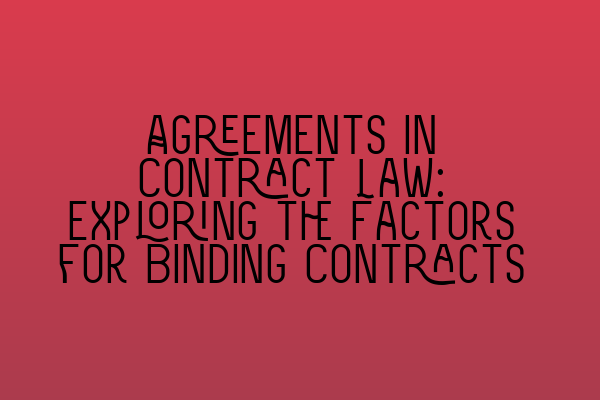Agreements in Contract Law: Exploring the Factors for Binding Contracts
Welcome to our comprehensive guide on agreements in contract law. In this post, we will delve into the factors that make a contract binding and enforceable. Whether you are a law student, a legal practitioner, or simply curious about contract law, this content will provide you with valuable insights. So, let’s get started!
What is a Contract?
Before we dive into the factors that make a contract binding, let’s first understand what a contract is. In legal terms, a contract is an agreement between two or more parties that creates enforceable obligations. It is a cornerstone of commercial relationships, ensuring that parties involved are held accountable for their promises.
A contract typically consists of four essential elements:
- Offer: An offer is a proposal made by one party to another, indicating their intention to enter into a contractual agreement.
- Acceptance: Acceptance occurs when the party receiving the offer agrees to its terms and conditions without any modifications.
- Consideration: Consideration refers to something of value exchanged between the parties, such as money, goods, or services.
- Intention to create legal relations: For a contract to be binding, the parties must have a clear intention to create legal relations. This means that they intend for the agreement to be legally enforceable.
The Factors for Binding Contracts
Now that we have a basic understanding of what a contract is, let’s explore the factors that make a contract binding. These factors are crucial in determining the enforceability of an agreement in a court of law.
1. Offer and Acceptance
The first factor to consider is the presence of a valid offer and its acceptance. An offer must be clear, definite, and communicated to the other party. It should outline the essential terms and conditions of the contract. The acceptance must be unconditional and communicated in the manner specified in the offer.
For example, if Party A offers to sell their car to Party B for a specific price and Party B accepts the offer without any changes, both parties have a valid offer and acceptance.
Understanding the intricacies of offer and acceptance is crucial to determine the intentions of the parties and the formation of a valid contract. In some cases, the parties may engage in negotiations and make counteroffers, which will require further analysis.
2. Consideration
Consideration is another essential factor in forming a binding contract. Consideration refers to the exchange of something valuable between the parties. It can be a promise, an act, or a forbearance. Consideration ensures that both parties are obligated to fulfill their promises and provides a basis for the enforcement of the agreement.
For example, if Party A promises to pay Party B a sum of money in exchange for Party B’s provision of services, there is valid consideration. The promise of payment and the provision of services are the consideration exchanged between the parties.
It is important to note that consideration must be sufficient but not necessarily adequate. This means that the value of the consideration does not have to be equal between the parties. As long as there is some form of exchange, the requirement of consideration is fulfilled.
3. Intention to Create Legal Relations
The intention to create legal relations is a fundamental factor in determining the enforceability of a contract. It signifies that the parties intended to enter into a legally binding agreement. This factor separates agreements with social or domestic intentions from those with legal consequences.
In general, commercial agreements are presumed to have an intention to create legal relations, while social or domestic agreements are presumed otherwise. However, this presumption can be rebutted by providing evidence showing a contrary intention.
For example, if two friends agree to meet for dinner, there is no intention to create legal relations as it falls under a social arrangement. However, if a business entity enters into a contract with another business entity for the supply of goods, there is a clear intention to create legal relations.
4. Capacity to Contract
The final factor we will discuss is the capacity of the parties to enter into a contract. Certain parties may lack the legal capacity to form a contract, such as minors, individuals with mental incapacity, or individuals under the influence of drugs or alcohol. Contracts entered into by parties lacking capacity may be voidable or void.
However, it is crucial to note that contracts entered into by individuals lacking capacity may still be binding if it falls within a specific exception or is ratified once the individual attains capacity.
Conclusion
In conclusion, understanding the factors for binding contracts is essential to ensure the enforceability and validity of agreements. The presence of a valid offer and acceptance, consideration, intention to create legal relations, and capacity to contract are all crucial elements.
If you are studying for the SQE exams, this knowledge is crucial for success. Make sure to check out our related articles on SQE 1 Practice Exam Questions, SQE 1 Practice Mocks FLK1 FLK2, SQE 2 Preparation Courses, SQE 1 Preparation Courses, and SRA SQE Exam Dates to enhance your understanding and preparation for the exams.
Remember, in the complex world of contract law, attention to detail and a comprehensive understanding of the factors for binding contracts can make all the difference in protecting your clients’ interests and ensuring successful legal outcomes.
